Contents
Market Overview
Macro Review
UK inflation rose at its highest level since 1992 and U.S. retail sales jumped at the fastest pace in ten months. Meanwhile, the Fed’s Bullard reiterated his view of a 50 bp hike in March and a full 100 bp by July but raised the odds of an unscheduled FOMC meeting. Volatility in U.S. Treasuries was notably elevated as the MOVE index increased above 100 pts for the first time since the March 2020 sell-off this week. On the flip-side, mixed messages are a continual theme out of the ECB as Lagarde reiterated gradual moderation against a louder voice of hawks. Schnabel’s view was clear in the FT regarding acting too late on inflation, Knot previously sought lift-off in 4Q and Villeroy said QE changes would be considered in March and bond buying could end in 3Q. Indeed, the market has already begun pricing in higher European rates in 3Q. Geopolitically, the overwhelming focus has been on tensions between Russia and Ukraine, just as five-year CDS spiked on Friday and re-tested the highs of 280 bp. It is becoming clearer that the ruble is proving more resilient relative to rates (OFZ) and credit (including cash bonds and CDS). Despite ongoing disturbances in Donetsk and Luhansk around false flag conflict, oil prices remained steady given U.S./Iran nuclear negotiations. Elsewhere, Chinese inflation moderated in January, offering the PBoC more room to ease in future (the next loan prime rate decision is next week) and Brazil’s BCB Governor Campos Neto highlighted that inflation is expected to moderate in April/May. However, higher EM inflation has also been fueled by tax cuts, at least in Poland, that in part contributed to the 9.2% y/y reading. We also note that Brazil’s parliament is seeking to lower fuel prices and Turkey cut VAT on certain goods from 8% to 1% (but the CBRT kept rates unchanged).
EM Credit Update
Emerging market sovereign credit ended the week down 0.3%, with credit spreads widening 2 bp. Outperformers over the week were Sri Lanka, Argentina and Lithuania, while Zambia, Tunisia and Ukraine underperformed. Aside from flatter EM curves in spread as U.S. treasuries steepened in yield, the primary market reopened in convincing fashion. Turkey and the Dominican Republic issued $6.5 bn in aggregate, which was well absorbed and both credits traded well.
The Week Ahead
The closing ceremony of the Winter Olympics remains an important fixture for a number of reasons. It falls on the eight-year anniversary of Russia’s invasion of Ukraine and the end of Russia’s military drills in Belarus, but also is the beginning of the end of COVID-19 restrictions, at least in Europe, U.S. and Australia. Through next week, European PMIs, U.S. GDP and the U.S. PCE, will be the main check-points aside from U.S./Russia dialogue around Ukraine. Beyond that, EM interest rate decisions are due from China Loan Prime Rates (3.7% and 4.6%), Hungary (4.3%), Israel (0.1%) and South Korea (1.25%). Other events such as economic activity out of Argentina, and then inflation out of Brazil, Hong Kong and Mexico, are also due.
Highlights from emerging markets discussed below include: Decisive week ahead in Russia-West tensions over Ukraine, Argentina signals further progress with IMF negotiations; BCRA hikes rates further, Global emerging markets corporates in focus: Pray for peace, prepare for war?
Fixed Income
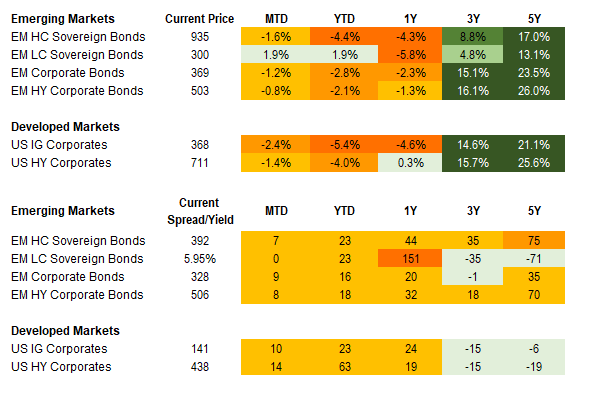
Equities
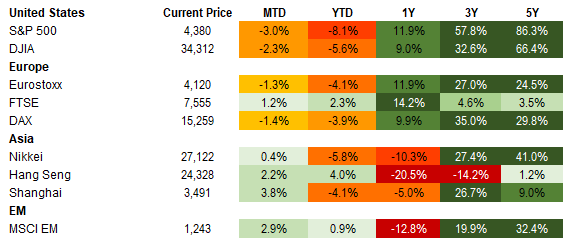
Commodities

Source for data tables: Bloomberg, JPMorgan, Gramercy. EM Fixed Income is represented by the following JPMorgan Indicies: EMBI Global, GBI-EM Global Diversified, CEMBI Broad Diversified and CEMBI Broad High Yield. DM Fixed Income is represented by the JPMorgan JULI Total Return Index and Domestic High Yield Index. Fixed Income, Equity and Commodity data is as of February 18, 2022 (mid-afternoon).
Emerging Markets Weekly Highlights
Decisive week ahead in Russia-West tensions over Ukraine
Event: This week, global markets remained caught in a relentless “tug-of-war” between escalation and de-escalation rhetoric/headlines about the situation on Ukraine’s borders. An incursion that U.S. intelligence claimed Russia had planned for mid-week did not materialize and the Russian Ministry of Defense posted videos of military personnel and vehicles returning to their home bases. However, the West remains skeptical and continues to insist that a military attack on Ukraine could happen “at any point”. Reported exchange of fire between Russia-backed separatist militias and government forces in Eastern Ukraine have raised concerns that it could be used as a possible trigger for an intervention by Moscow. Meanwhile, German Chancellor, Olaf Scholz, visited President Putin in the Kremlin and Ukraine organized a “National Unity Day” on Wednesday, the day flagged by the U.S. as most likely for a Russian attack on the country. High-level diplomacy efforts continued across Europe with focus shifting on possible progress by Ukraine and Russia in implementing the Minsk peace agreements as a way forward toward de-escalation.
Gramercy Commentary: Against this highly dynamic and complex backdrop, this weekend and the coming week offer some critical signposts for investors on the trajectory of the crisis. Above all, ongoing Russian military drills in Belarus, which are close to Ukrainian territory, are scheduled to conclude on Sunday, February 20, the same day the Winter Olympics will end. In the context of Russia’s improving relationship with China, some observers have pointed to the Beijing Olympics as an obstacle to potential Russian action in Ukraine. As such, events this weekend should send meaningful signals to markets amid all the confusion and persistent media noise of the last few weeks. If Russian troops leave Belarus and return to their bases (some in the Russian far east), this should provide an element of “meaningful” and “verifiable” de-escalation, as called for by U.S. State Secretary Blinken this week. On the flip side, a scenario involving Russian military units remaining in Belarus or relocating to a Russian territory in proximity to Ukraine’s border will likely be seen as escalatory. Meanwhile, developments along the line of control in the Donbas conflict zone and the domestic public discourse on Russian State TV will be two other critical factors to follow closely for signals on where the crisis is headed. We continue to believe that the cost/benefit analysis from the Kremlin’s perspective points toward maintaining “maximum pressure” on the West via Ukraine in an attempt to secure as advantageous a position as possible in potential forthcoming “grand bargain” negotiations over European/Eurasian security, but stop short of actual military action that would come at an unacceptably high cost for Russia, in our view. From an investment perspective, we see Russia and Ukraine as significantly undervalued relative to their underlying sovereign credit quality, but we do not expect a material compression of geopolitical risk premia until clear de-escalation signals emerge from both Moscow and Washington.
Argentina signals further progress with IMF negotiations; BCRA hikes rates further
Event: Local press indicated that further advancement has been made between the IMF and Argentines on a deal to refinance its $40bn in outstanding debt, including informal IMF Board approval. Government officials plan to discuss and approve the terms in Congress in the first week of March. Meanwhile, January monthly inflation remained elevated at 3.9% albeit down from 4.1% in December. BCRA hiked its reference rate by 250 bps to 42.5% following a 200bps hike last month in an effort to tame prices at least partially in an orthodox manner. Additionally, the official peso monthly depreciation rate has picked up from 1.8% in December to 2.2% in January and around 2.6% in February.
Gramercy Commentary: We see the headlines as constructive and indicative of positive momentum towards a deal, and if valid, prospects for an official IMF staff level agreement imminently. Thereafter, the timing of board approval will likely be dependent on the duration of congressional debate and approval. While there is still room for domestic political noise and abstentions from both the ruling and opposition coalitions, our base case remains that the agreement passes. The improved sentiment combined with additional incremental acceleration of the official FX rate alongside positive seasonality should further reduce the BCS-official gap, which has recently dropped to around 100% from 120%. Absent unwind of capital controls and a more significant orthodox macroeconomic adjustment, which is outside of our near-term base case, a sizable gap will likely persist with bouts of volatility on program implementation and seasonal dynamics.
Global emerging markets corporates in focus: Pray for peace, prepare for war?
Event: Russia and Ukraine continue to generate headlines. We have had more dire warnings from authorities in the U.S., UK and elsewhere about Russia’s plans. Russia has maintained the same stance through all this (i.e.: no invasion is planned). Ukraine’s President has also sought to diffuse concerns by turning to satire in a now-infamous Facebook post, though even he conceded that there was no sign of a Russian pullback yet. All sides appear to agree that there is still room for diplomacy, with more meetings scheduled to take place in the coming days. Having said that, emerging markets corporates have already been impacted by talk of a potential invasion and the ramifications that could have.
Gramercy Commentary: The impact of Russia-related tensions has been most obviously felt in the world’s energy markets, with both Brent and WTI at multi-year highs and with higher gas prices leading to concerns about a cost-of-living crisis in developed and emerging market countries alike. The impact of these higher prices, especially on corporates operating in countries which import these commodities, cannot be understated. Higher fuel costs may impact margins by raising operating costs and may lead to more subdued consumer spending on non-essential goods and services. For oil exporters however, the rise in prices has been seen as positive. Potential sanctions on Russian entities which might follow any invasion have received significant focus – we have written about this in the past ourselves. Recently, reports suggest that at least one Russian lender has engaged lobbying help in an attempt to address this possible risk. There are also concerns about the impact invasion fears may have had on revenues at some companie. Consumers may put off spending decisions and companies’ CAPEX plans may have been delayed. In addition, these tensions have largely shut the Eurobond market to issuers from the region, reducing refinancing options for issuers. Having said that, the declines in bond prices – in several cases by tens of points – may well incentivize issuers to pursue buybacks, though it seems likely that such liability management will only occur once there is clarity about Russia’s intentions (however, it is noteworthy that the Ukraine sovereign has already bought back bonds). For banks’ subordinated bonds, the rise in yields has led to questions about the likelihood of call options being exercised. Much will depend on Russia’s banking regulator and on each issuer’s capital buffers. Reputational factors may also be considered. Tensions have also impacted companies which are headquartered in other jurisdictions but have exposure to Russia and Ukraine, with reports of companies seeking to limit the impact of potential sanctions on their operations. Over the next few days, effective diplomacy will be crucial for issuers in Russia and Ukraine, and others operating further afield too.
Emerging Markets Technicals
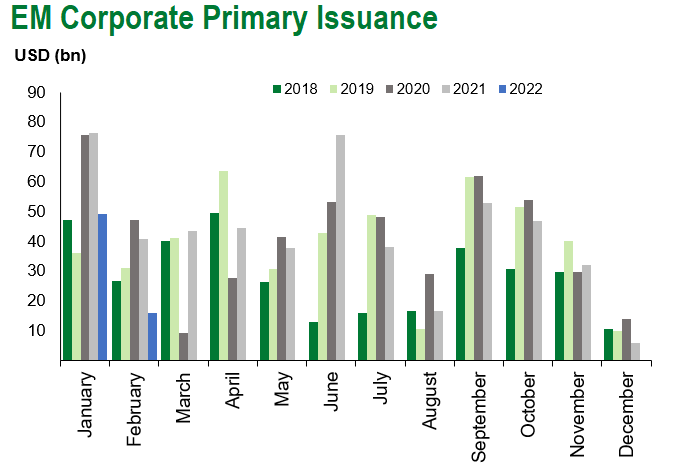
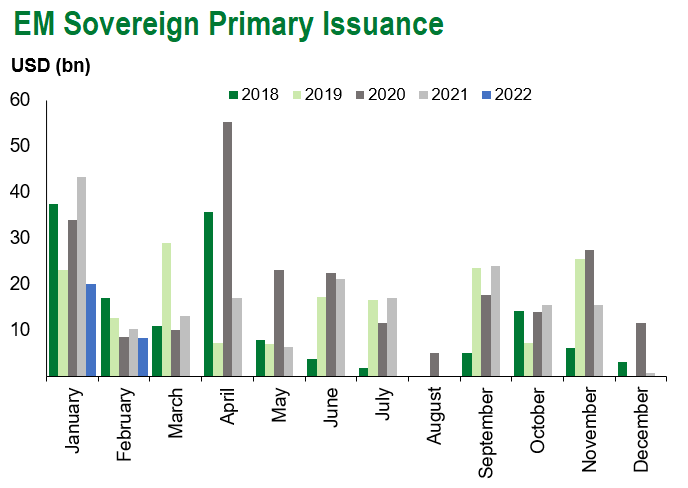
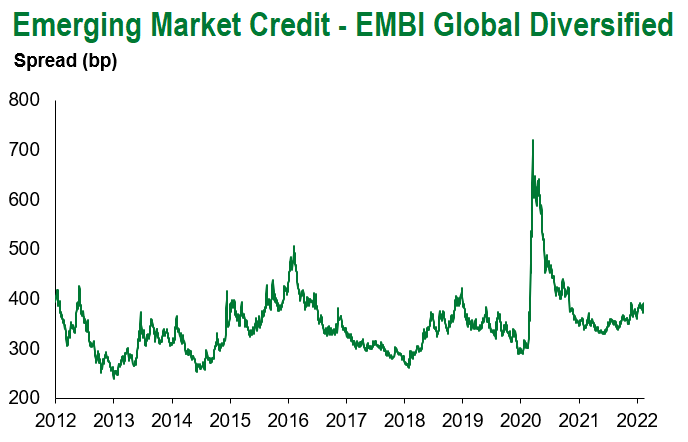
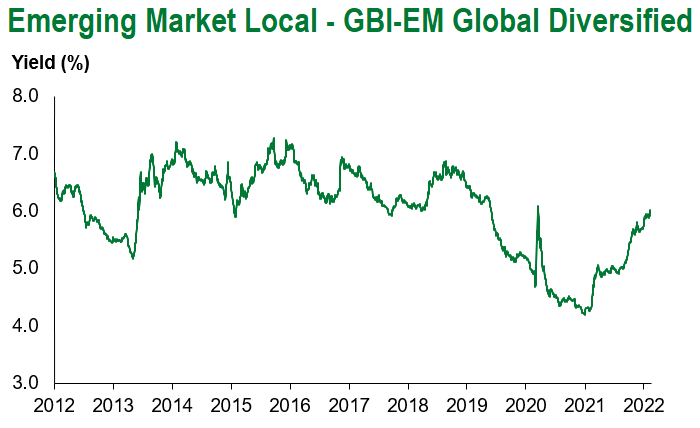
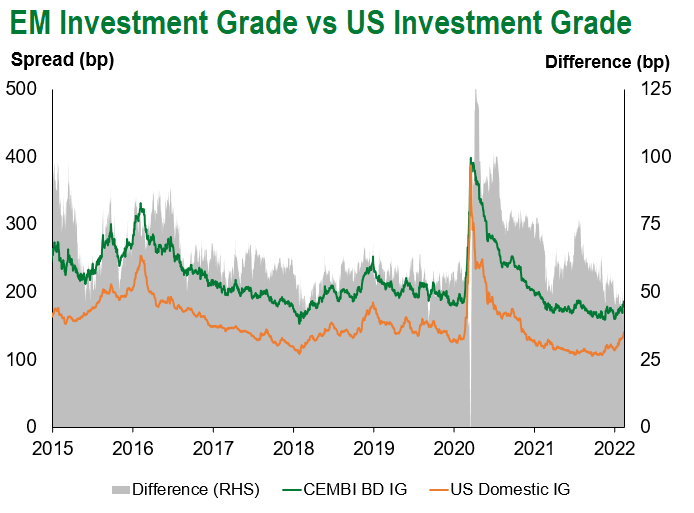
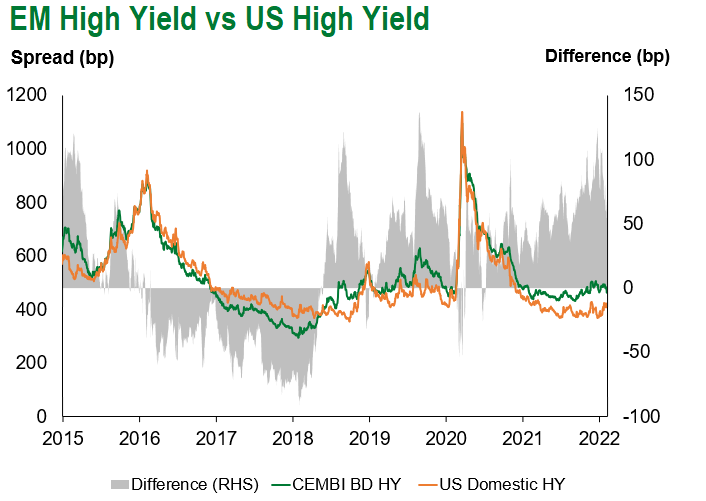
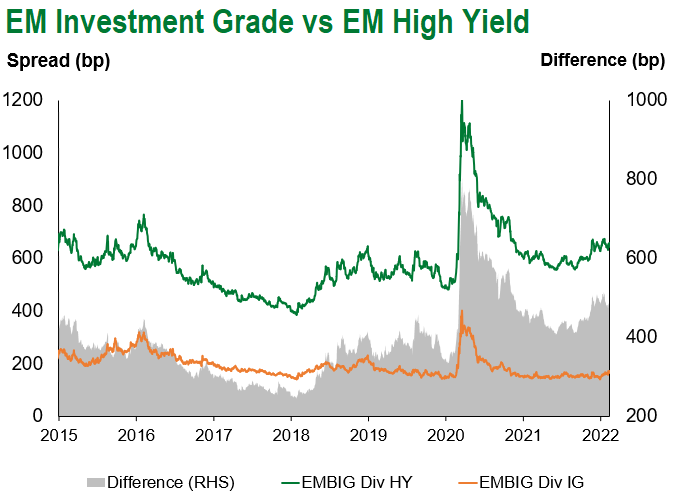
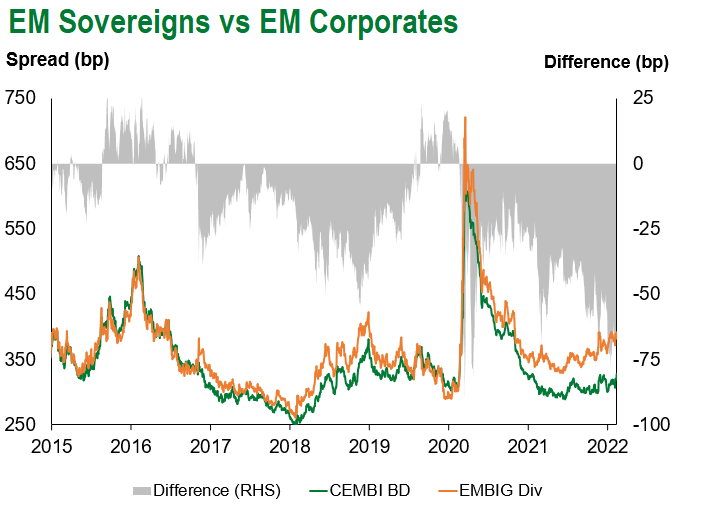
Emerging Markets Flows
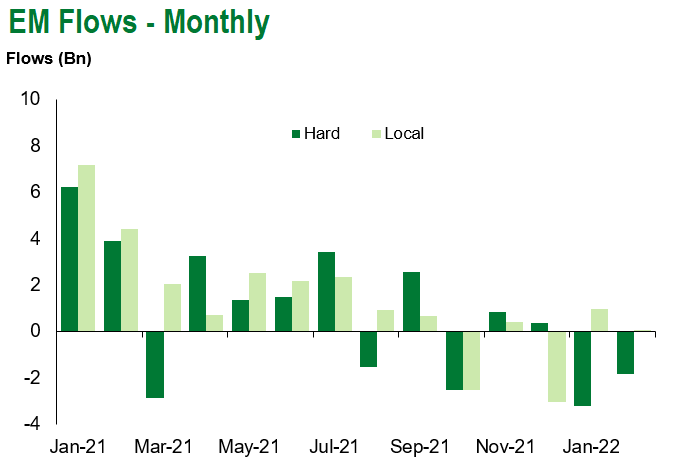
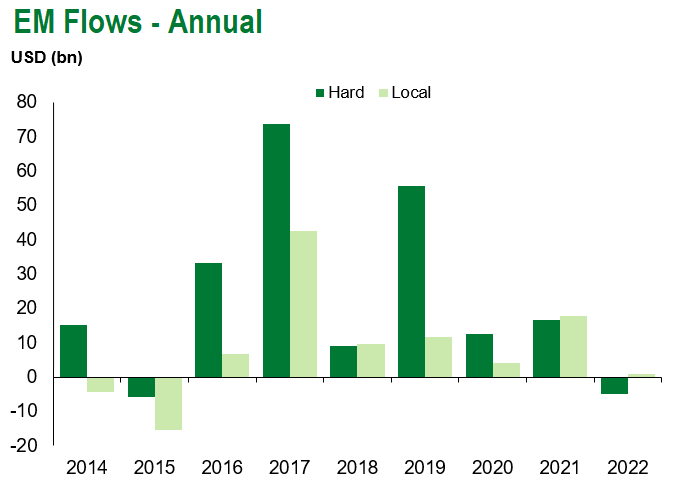
Source for graphs: Bloomberg, JPMorgan, Gramercy. As of February 18, 2022.
COVID Resources
Emerging Markets COVID-19 Case Summary
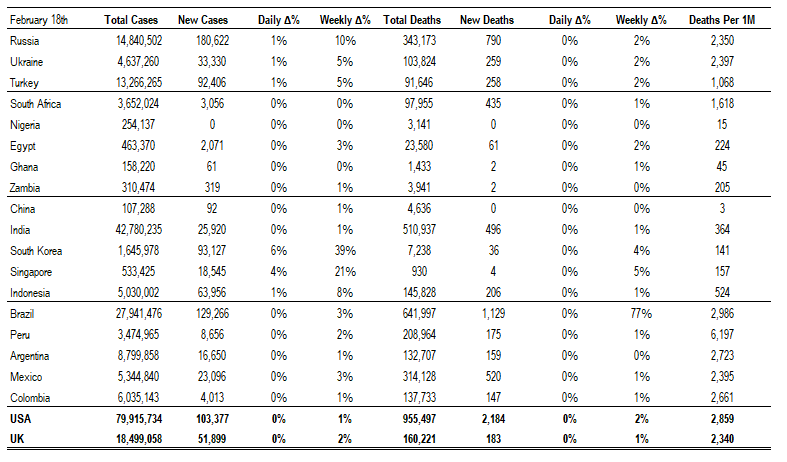
Source: Worldometer as of February 18, 2022.
Additional Crisis Resources:
Johns Hopkins COVID-19 Case Tracker
For questions, please contact:
Kathryn Exum, CFA ESG, Senior Vice President, Sovereign Research Analyst, [email protected]
Petar Atanasov, Senior Vice President, Sovereign Research Analyst, [email protected]
Tolu Alamutu, CFA, Senior Vice President, Corporate Research Analyst, [email protected]
James Barry, Vice President, Corporate Research Analyst, [email protected]
This document is for informational purposes only. The information presented is not intended to be relied upon as a forecast, research or investment advice, and is not a recommendation, offer or solicitation to buy or sell any securities or to adopt any investment strategy. Gramercy may have current investment positions in the securities or sovereigns mentioned above. The information and opinions contained in this paper are as of the date of initial publication, derived from proprietary and nonproprietary sources deemed by Gramercy to be reliable, are not necessarily all-inclusive and are not guaranteed as to accuracy. This paper may contain “forward-looking” information that is not purely historical in nature. Such information may include, among other things, projections and forecasts. There is no guarantee that any forecasts made will come to pass. Reliance upon information in this paper is at the sole discretion of the reader. You should not rely on this presentation as the basis upon which to make an investment decision. Investment involves risk. There can be no assurance that investment objectives will be achieved. Investors must be prepared to bear the risk of a total loss of their investment. These risks are often heightened for investments in emerging/developing markets or smaller capital markets. International investing involves risks, including risks related to foreign currency, limited liquidity, less government regulation, and the possibility of substantial volatility due to adverse political, economic or other developments. The information provided herein is neither tax nor legal advice. Investors should speak to their tax professional for specific information regarding their tax situation.